From November 14-16, 2018, political and health leadership from the seven Interior Nations—Dãkelh Dené, Ktunaxa, Nlaka'pamux, Secwepemc, St'át'imc, Syilx and Tsilhqot'in—gathered for the 2018 Interior Regional Caucus in Syilx Territory (Kelowna, BC). The dialogue on day one was co-chaired by First Nations Health Council (FNHC) representative Allan Louis and First Nations Health Directors Association representative Jackie McPherson. Days two and three were co-chaired by Allan Louis and FNHC representative Charlene Belleau.The caucus session was hosted by the FNHC, First Nations Health Authority (FNHA), and FNHDA. Forty-five Chiefs and proxies were in attendance, alongside 47 Health Leads and 20 Social Leads.
Welcome and Ceremony
Knowledge Keeper Leon Louis of the Syilx Nation opened up the three-day caucus session with a prayer and some inspirational words. He talked about the healing power of traditional medicine and the importance of taking care of the water and the earth. Drummers and singers from First Nations in the Interior Region acknowledged the hard work and commitment of their Health Directors. This opening was followed by three young women from Syilx Nation who helped start the day off well with their powerful singing – highlighting the leadership's collective focus on healthy, vibrant future generations of BC First Nations.
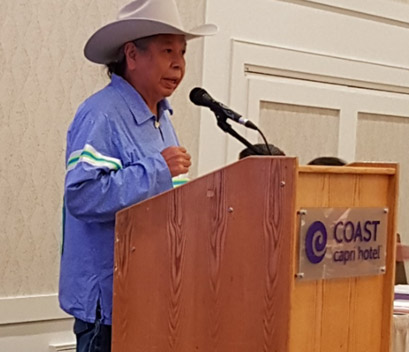
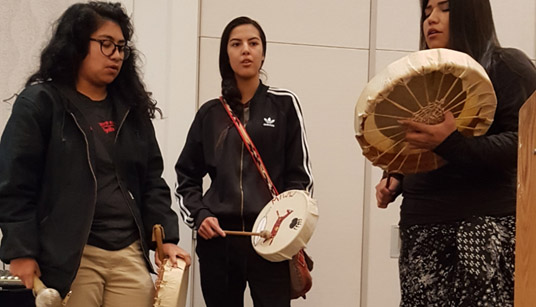
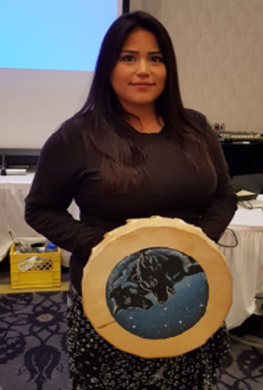

Day one began with an update from Interior FNHDA Board representatives Jackie McPherson, Franny Alec, and Shelley Lampreau. They were pleased to share that the mental health and wellness concerns of Health Directors were being heard.
The technical advice provided by health leadership informed the implementation of the Memorandum of Understanding (MOU) on Mental Health and Wellness signed by the FNHC, Government of Canada and Province of British Columbia in July of this year. The FNHDA representatives noted that they are also working closely with FNHA on phase two of the health benefits transition for the provision of vision, dental, medical supplies/equipment benefits.
FNHA Update: Primary Care, Mental Health and Wellness
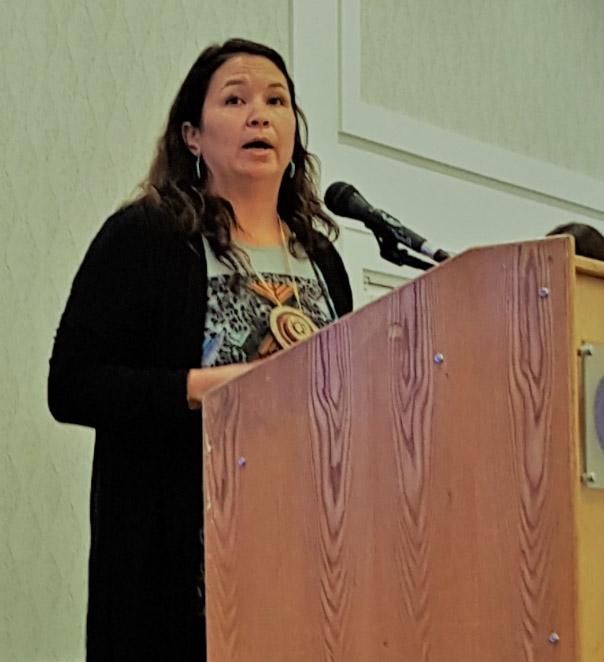
Lisa Montgomery-Reid, Interior Region Executive Director, talked about the realities for First Nations in the Interior in accessing primary care. The main challenges include the lack of coordination of family doctors/general practitioners (GPs) and nurse practitioners (NPs) with community-based supports, community services operating in silos, and a lack of access to specialized medical services for many communities.
Lisa emphasized the goal of transforming primary care to a model of integrated primary and community care called "primary care networks". New funding announced by the Province of BC will support this vision and the FNHA is assisting Health Directors in participating at the table with GPs and NPs (to decide how to implement the new funds) by advocating for resources and providing data.
Lisa discussed the Interior Region's plan to support community readiness for the mental health MOU funding. FNHA's Interior Region team will support Nations in developing their "expression of interest" for review in December/January.
After Lisa's presentation, leadership split into break out groups by Nation to discuss how to best use the tripartite funding.
The first day also included a presentation about Meditech, the electronic health records system used by Interior Health for all clients in the region as well as a sneak peek at a draft of the FNHA's new Health and Wellness Planning Toolkit, which has been redesigned with a community-driven focus instead a program focus lens.
Wise Health Planning Practices at Westbank First Nation
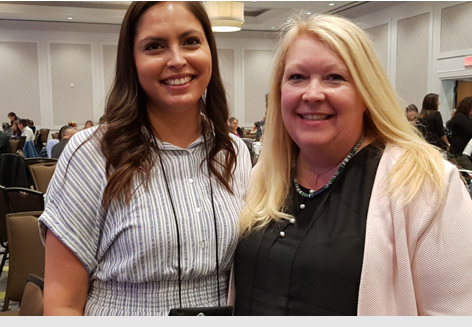
Kelsey Lindley and Maria Reed from Westbank First Nation Community Services
Maria Reed, Director of Westbank First Nation Community Services, presented about the wise practices for community health and wellness planning used by her community's health centre.
"We use a web analogy for planning. Our clients are in the middle of the web and the health staff are the ones that hold the strands of the web – to keep clients at the centre of all that we do," explained Maria. "Our planning is grounded in highly inclusive community consultation."
Health Benefits Dental, Vision and Medical Supplies and Equipment
Darren McKnight, FNHA Director of Health Benefits Management and FNHDA representative Jackie McPherson facilitated a discussion on Phase Two of the Health Benefits transition of vision, dental, and medical travel and equipment.
Jackie emphasized that the FNHDA and FNHC will be providing technical advice for the transformation process to FNHA on the Second Phase to ensure that community concerns and perspectives are incorporated at the planning stages. Jackie noted that she was very pleased that "FNHA is there to support us through this process of improving services. Health Canada never was and I appreciate this (support)."
Darren spoke about lessons learned from the Plan W transition. "We want to have two-way conversations with Community. We will start earlier and listen more." He also noted that FNHA will work closely with providers and their frontline staff – people right at the point of access to services – to make this a smoother transition. Darren also highlighted that FNHA has hired a third party to perform an independent evaluation of Plan W. The FNHA will act on the findings to ensure that the recommendations inform the next phase of transfer from NIHB.
Lots of Dialogue
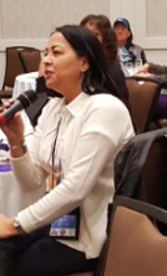
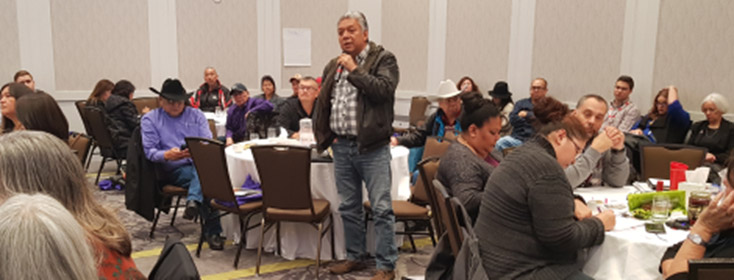
A dynamic and lengthy Q & A session followed in which leadership shared their views and their concerns about this transition based on experiences with the transition to Plan W. Nations expressed understanding of the complexity of the transition process but also concerns about the lengthy consultation process and waiting two more years before the transition is complete.Focal points of the conversation during the Q & A included a desire for improved benefits overall, more education for providers, issues with cataract care, dental benefits for crowns and dentures, and delays in receiving much needed equipment benefits. Many heartfelt stories were shared when discussing these challenges.
Grandmother's Declaration

Chiefs and Health Leads opened Day Two with a pipe ceremony and then hands raised in song to honour all grandmothers. Chief Harvey Macleod of the Upper Nicola Band spoke about the Grandmothers' Declaration, in which grandmothers "stand up and take responsibility for our children".

Following this ceremony, loved ones lost to overdose or who are struggling with addiction were honoured. Participants wrote messages for their fallen warriors on small tags and then hung their message on one of the trees of hope. The trees of hope flanked the quilt created during Gathering Wisdom IX to honour loved ones lost to the overdose crisis.
Working in Partnership
Partners presented to leadership information on their joint priorities and cultural safety. Interior Health (IH) Board Chair Doug Cochrane talked about how IH is expanding support for First Nations in the Interior for mental health and wellness and has made an ongoing commitment to home care in Community. IH is working on many fronts within its organization to educate its staff on cultural safety.
Tsilhqot'in Nation Nurse Wanda Charleyboy talked about the benefits of the nurse exchange she is participating in with IH. So far one IH nurse has visited her remote community of Xeni Gwet'in which led to a much greater understanding by IH staff of First Nations culture, clients and their health needs.
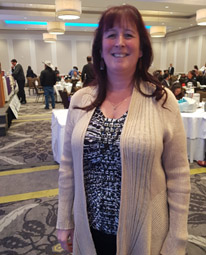
Emergency Management: Fires and Flooding
Charlene Belleau of Secwepemc Nation, Jody Nishima of Tsilhqot'in Nation, and Chief Keith Crow of Syilx Nation shared their perspectives on the impacts of fires and flooding in 2018 and the issues that need to be addressed to improve emergency management for First Nations communities.
A panel of government representatives were in agreement about working together with First Nations communities to develop a provincial recovery framework in which First Nations are recognized at every level in terms of emergency management. Catherine Lappe, Indigenous Services Canada's Regional Director General, emphasized "We have no choice but to get this right. Achieving tripartite agreement about emergency management is critical."
Areas of concern identified by the room included the need for infrastructure, the lack of water for fire protection, support for loss of cattle, and the negative impacts of logging practices were recognized. Due to the devastating impact of emergencies on Interior Nations, leadership tabled and passed a special resolution declaring a state of emergency and calling on provincial and federal partners to engage directly with Interior Nations to respond to fires and flooding. The resolution was proposed by Kukpi7 Wayne Christian of Splatsin and seconded by Chief Byron Louis of Okanagan Nation.
Supporting Community Mental Health and Wellness
A panel from FNHA, including Richard Jock, Chief Operating Officer and Katie Hughes, Executive Director, Mental Health and Wellness along with Nick Grant for the Ministry of Mental Health and Addictions presented on the Memorandum of Understanding (MoU) on Mental Health and Wellness, signed in July of this year. The panel emphasized the flexibility of this funding approach and discussed the options for implementing the funding in Community.
Addressing Opioids and Addiction
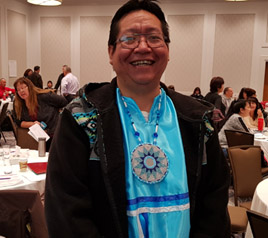
One of the highlights of Day Three included keynote speaker Jared Basil, an elected leader from Ktunaxa Nation. He gave an inspiring and insightful talk about the many challenges he has faced, including his struggle with addiction. "Never give up on people! We need to create a new path that welcomes everybody," he urged. "Harm reduction is a great step along that path. It tells us that we belong somewhere." Jared encouraged leadership to think differently and look at people differently.Leadership discussed opioid response strategies for Interior Nations and discussion centered on better and more pre- and post-treatment supports, reaching youth, and expediting access to Opioid Agonist Therapy (OAT), such as Suboxone.
Cannabis and Health
The final day ended with an information rich dialogue about cannabis legalization and the possible impacts to Interior Nations. Dr. Nel Wieman, FNHA Senior Medical Officer, presented on FNHA's cannabis public education campaign, noting its harm reduction approach. Community leaders talked about the positive impacts of cannabis decriminalization, medical versus recreational use, regulations for production, and concerns about having dispensaries in community.
The last day of caucus was closed out by Charlene Belleau on an optimistic note. "We have a bright future. Our young people are going to take on government and lead us to good, healthy families. They are so powerful!"

